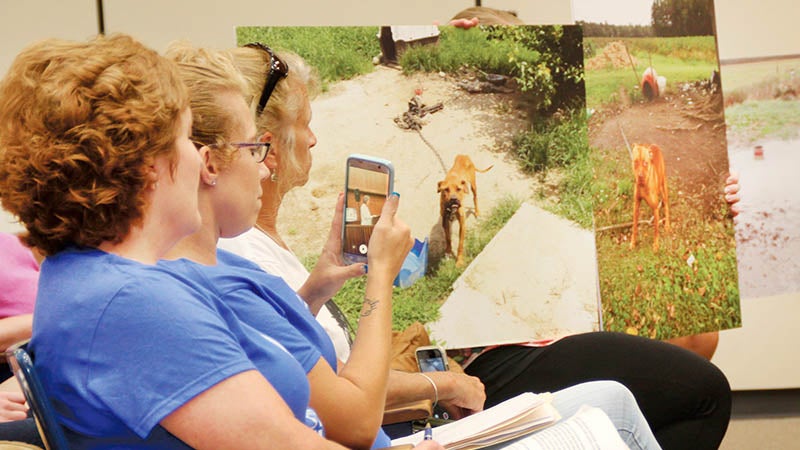Passionate plea
Published 1:27 pm Thursday, August 10, 2017

- Those seated in the audience at the Aug. 2 meeting of the Gates County Board of Commissioners hold enlarged photographs taken in the county of deplorable living conditions of domesticated animals. | Staff Photos by Cal Bryant
GATESVILLE – “Break the chain…life on a chain is not living.”
Those words, listed in large letters on an oversized board, served as the backdrop as nine speakers filed to the podium here last week to address the horrifying death of a pit bull back in early July. That animal was reportedly chained to its doghouse, one located in the backyard of a residence on Roundtree Lane near Gatesville. That dog’s death sparked outrage on social media across the United States.
That group of local citizens and one official from PETA pleaded with the Gates County Board of Commissioners to strengthen a county ordinance dealing with animal welfare. More specifically, the group wants to end the use of allowing dog owners to use a tethered chain on their animals as well as enact more stringent regulations dealing with providing proper shelter, water and food to animals.
Carol Whitt said her voice was for the proper care of animals across Gates County.
“I’m not here to blame; I’m not here to bash; rather, I’m here to state facts,” she said. “First and foremost I believe the (dog’s) owner was negligent; it was cruel to have a dog to suffer on the end of a heavy chain and suffer in 100 degree heat. The next fault goes to the (Gates County) Sheriff’s Office. Animal Control was called, but he was not on duty; so the called was unanswered. We need to have somebody on duty to answer calls from concerned citizens about animals in distress.”

Carol Whitt was among the Gates County citizens making comments concerning animal welfare last week.
Whitt described the incident on Roundtree Lane as “an emergency.”
“This was a dog in distress, suffering horribly in the heat,” she remarked. “The only ones to witness it were the four other dogs on this property. They were chained; they heard the distress; they heard to suffering and they’re still chained and they’re still struggling to survive in the heat.
“We have hundreds of dogs like this in our county,” Whitt continued. “I pleaded with you (commissioners) back in 2014 to take a ride in our county and take a look for yourselves. We have got to update our ordinances; they are still allowing cruel, negligent and abusive owners to get a free pass. We have a moral obligation to make this right.”
Denise Miller of Eure spoke of “Cal” – the late K-9 Officer with the Gates County Sheriff’s Office. She cited his work and bravery in the line of duty, helping his handler over the course of his career seize over $250,000 in illegal drugs.
“His care and life was treasured and respected; is that not what we want for all dogs,” Miller asked. “Or do we want the heavy chains around their necks? Do we want them to go without life-saving food and water on a 100-degree day or a freezing cold day? Do we want them to be part of the family, granted proper food, proper shelter and a pat on the head?
Miller stressed that all dogs deserve basic care such as food/water, shelter and love.
“If people cannot do that, then they do not deserve to have an animal,” she concluded.
Gary Ingram of Corapeake also expressed his concerns about the “poor and inhuman treatment of animals in the county” and what he termed as “unresponsible actions by the commissioners to revise the codes and ordinances currently in effect.”
“Even after this was witnessed by Animal Control and the Sheriff, I find it incomprehensible that actions weren’t taken, and the other animals not seized,” Ingram said. “The Sheriff found this hard not to recognize (alleged cruelty) and said further investigation was needed.”
As a former police officer, Ingram said law enforcement officials often use discretion was an investigative tool.
“But (in this case), this was nothing more than dereliction,” he said. ‘Violations not clearly covered by our ordinances are certainly found in our state codes, and law enforcement officers are sworn to uphold all state, federal and local laws.
He cited another instances of animal cruelty in Gates County, to include horses and other farm animals.
“You, our commissioners, need to revise our current codes and ordinances to reflect the need for the humane treatment of these animals,” Ingram added.
Doug Bailey of Corapeake, who served as chairman of a committee appointed by the commissioners three years ago to help write the animal welfare ordinances currently on the books, said that code included a definition of a proper shelter.
“It has to have three walls and provide shelter from wind, rain, ice, snow, and sun. That particular standard needs to be revised. I tried to get that written back in 2013 so there would be no gray area for an Animal Control Officer to look at and determine what was proper shelter,” he said.
Citing national animal welfare organizations, Bailey said proper shelter needs to have a roof, inside space large enough for an animal to move freely, and it needs a floor.
“That is not written into our law; our animals deserve better,” he stated.
He said there are cases in the county where dog owners do not look at their domesticated animal as a pet or as part of the family.
“They are put out in a yard as a burglar alarm,” Bailey observed. “That has to change.”
Bailey said of the 13 recommendations suggested by the committee in 2013, only seven were approved by the commissioners, and the majority of those were modified.
“Others were turned down by you because it was felt that they would make the hunters in the area mad,” he recalled. “We worked hard to develop these ordinances and we worked for six months and brought them before this board and only seven of the 13 were passed.”
Ann Hand of Middle Swamp Road noted the weather extremes in the county – high heat and humidity in the summer and cold winters.
“Some people have no empathy for animals,” she said. “Tying them to a chain in those extreme weather conditions is horribly cruel. What if the people that do this had to trade places with these animals, if only for one day. Then maybe they would have an idea of how inhumane the treatment of these animals really is.”
Daphna Nachminovitch, Senior Vice President of Cruelty Investigations for PETA in Virginia Beach, told of what she described as a “cruel and inhuman death” of the pit bull located behind a residence off Roundtree Lane.
“The dog was tethered by a heavy metal chain in the full sun and he apparently had a bone dry water bucket,” Nachminovitch recalled. “Even though this was clearly an emergency, the local Sheriff’s Office did not send anyone that day.”
The following day, after a local citizen noticed that the dog was not moving and may have died, PETA was contacted.
“We rushed out and arrived shortly before a (Gates County) deputy,” Nachminovitch stated. “We offered to pay for and/or arrange for a post mortem exam of this dead dog’s body. The deputy declined our offer and asked us to leave the property, which we did.”
That post mortem exam, she said, was offered again the same day, but no response came from the local Sheriff.
“We later learned that the dog’s owner was allowed to dispose of the dead animal and that no charges would be filed,” she said. “There are still several pit bulls chained on this property in similar conditions, apparently to be used for breeding.”
Nachminovitch said heat stroke is a gruesome way for dogs to die, as they will lose control of their bladder, will go into shock, vomit blood, and suffer liver, kidney and brain damage.
“The manner in which this dog was kept is not isolated, unfortunately,” Nachminovitch noted. “This summer our field workers have found other dogs in distress as well as others that have died at the end of their chains.”
She added that chained dogs are often deprived of food, water and shaded shelter.
“Dogs deserve better than to watch life pass them by as they silently suffer physical neglect and psychological torment of isolation. We urge you (commissioners) to add Gates County to the list of local jurisdictions that have legislation against sentencing man’s best friend to a life sentence without parole. We will help you craft such an ordinance,” she closed.
Not all those speaking at last week’s meeting were in agreement that the local Sheriff’s Office was at fault in this particular case.
“The condition in which some of our citizens keep their dogs….do I agree with it; no,” said Anthony Saunders of Gates. “But based on our animal welfare ordinance, which I’ve read a few times, I feel that our Sheriff and our Animal Control Officer followed the law as it is written. They went as far as they could go based on this ordinance.
“To sit here and go after our Sheriff and Animal Control Officer simply because their hands were tied on certain things is not fair,” Saunders noted.
Saunders added that other animals in Gates County suffer neglect from their owners, to include horses, cattle and hogs.
William Roundtree, who owns the rental property where the pit bull died, stressed the need for the county to abolish the law that allows for a dog to be chained.
“And, if these dogs are kept in a kennel, it needs to be 10’ x 10’ with a raised floor and in cases where the temperature rises (in summer months), these kennels need to have electric fans,” Roundtree suggested. “I’ve been raising AKC registered Golden Retrievers for 25 years, so I have a pretty good idea of what should be done.
“You guys need to step up to the plate and get up with the times over the way things need to be done,” said Roundtree, referencing the commissioners. “It’s not just dogs, it includes horses who do not have enough acreage to meet their needs. The Sheriff can only enforce the rules that are adopted, but there’s still not enough teeth in that ordinance, to include how to prioritize emergency situations.”
At the end of the nearly 40 minutes worth of public comments, Commission Chair Linda Hofler thanked those who shared their concerns.
“We will take this under advisement,” she said.



